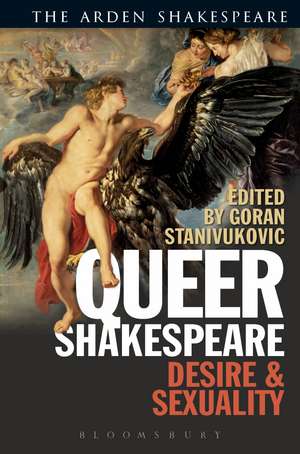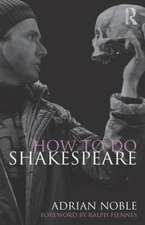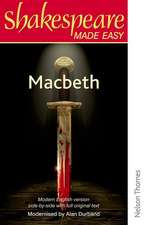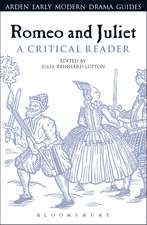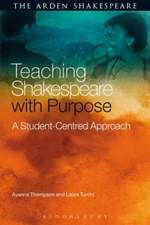Queer Shakespeare: Desire and Sexuality
Editat de Goran Stanivukovicen Limba Engleză Hardback – 12 iul 2017
| Toate formatele și edițiile | Preț | Express |
|---|---|---|
| Paperback (1) | 193.18 lei 3-5 săpt. | +33.83 lei 6-10 zile |
| Bloomsbury Publishing – 6 feb 2019 | 193.18 lei 3-5 săpt. | +33.83 lei 6-10 zile |
| Hardback (1) | 657.70 lei 3-5 săpt. | |
| Bloomsbury Publishing – 12 iul 2017 | 657.70 lei 3-5 săpt. |
Preț: 657.70 lei
Preț vechi: 943.85 lei
-30% Nou
Puncte Express: 987
Preț estimativ în valută:
125.87€ • 136.67$ • 105.73£
125.87€ • 136.67$ • 105.73£
Carte disponibilă
Livrare economică 02-16 aprilie
Preluare comenzi: 021 569.72.76
Specificații
ISBN-13: 9781474295246
ISBN-10: 147429524X
Pagini: 424
Dimensiuni: 129 x 198 mm
Greutate: 0.57 kg
Editura: Bloomsbury Publishing
Colecția The Arden Shakespeare
Locul publicării:London, United Kingdom
ISBN-10: 147429524X
Pagini: 424
Dimensiuni: 129 x 198 mm
Greutate: 0.57 kg
Editura: Bloomsbury Publishing
Colecția The Arden Shakespeare
Locul publicării:London, United Kingdom
Caracteristici
Distinguished contributors are all leaders in the growing field of queer theory in Shakespeare studies
Notă biografică
Goran Stanivukovic is Professor of English at Saint Mary's University. His most recent publication is Knights in Arms: Prose Romance, Masculinity, and Eastern Mediterranean Trade in Early Modern England, 1565-1655 (Universityof Toronto Press, 2016).
Cuprins
Introduction: 'Queer Shakespeare: Desire and Sexuality', by Goran Stanivukovic, Saint Mary's University, Halifax, Canada1.'Which is worthiest love' in Two Gentlemen of Verona?, by David L. Orvis, Appalachan State University, USA2. 'Glass: The Sonnets' Desiring Object', by John Garrison, Carroll University USA 3. 'The Sport of Asses: A Midsummer Night's Dream', by Kirk Quinsland, Fordham University, USA4. 'As You Like It or What You Will: Shakespeare's Sonnets and Beccadelli's Hermaphroditus', by Ian F. Moulton, Arizona State University, USA5. 'The Queer Language of Size in Love's Labour's Lost', by Valerie Billing, Knox College, USA6. 'Locating Queerness in Cymbeline', by Stephen Guy-Bray, University of British Columbia, Canada7. 'Desiring H: Much Ado About Nothing and the Sound of Women's Desire', by Holly Dugan, George Washington University, USA8. '"Two lips, indifferent red:' Queer Styles in Twelfth Night', by Goran Stanivukovic, Saint Mary's University, Halifax, Canada9. 'Queer Nature, or the Weather in Macbeth', by Christine Varnado, State University of New York, Buffalo, USA10. 'Strange Insertions in The Merchant of Venice', by Eliza Greenstadt, Portland State University, USA11. 'Male Femininity and Male-to-Female Crossdressing in Shakespeare's Plays and Poems,' by Simone Chess, Wayne State University, USA12. 'Held in Common: Romeo and Juliet and The Promiscuous Seductions of Plague', by Kathryn Schwarz, Vanderbilt University, USA13. 'Antisocial Procreation in Measure for Measure', by Melissa E. Sanchez, University of Pennsylvania, USAAfterword by Vin Nardizzi, University of British Columbia, Canada
Recenzii
Unifying past scholarship with vital queer theory, this collection reveals necessary insights into our evolving relationship with Shakespeare . This collection fervently reminds us that our largely underused queer imaginations may find productive new avenues to explore.
Through its insightful and apt discussions of Shakespeare's plays and poems, this volume offers specialists of early modern queer studies plenty to reflect upon. It will also be of great interest to readers who are not already conversant with queer theory.
Through its insightful and apt discussions of Shakespeare's plays and poems, this volume offers specialists of early modern queer studies plenty to reflect upon. It will also be of great interest to readers who are not already conversant with queer theory.
